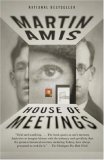Summary | Excerpt | Reviews | Beyond the Book | Readalikes | Genres & Themes | Author Bio

Critics' Opinion:
Readers' Opinion:
First Published:
Jan 2007, 256 pages
Paperback:
Jan 2008, 256 pages
 Book Reviewed by:
Book Reviewed by:
BookBrowse Review Team
Buy This Book
Another cup of coffee, another cigarette, and I'll go up on deck. The Siberian expanse, the olive-green immensity—it would frighten you, I think; but it makes Russians feel important. The mass of the land, of the country, the size of the stake in the planet: it is this that haunts us, and it is this that overthrows the sanity of the state . . . We are cruising north, but downriver. Which feels anomalous. Up on deck, it's as if the ship is motionless and the facing riverbanks are on the move. We are still; the riverbanks bob and undulate. You are borne forward by a power that is traveling the other way. You have a sense, too, that you are looming up over the shoulder of the world and heading toward an infinite waterfall. Here be monsters.
My eyes, in the Conradian sense, have stopped being Western and started being Eastern. I am back in the bosom of a vast slum family. Now it has to fend for itself. All the money has been divided up between the felons and the state.
It is curious. To type the word "Kansas" still seems reassuringly banal. And to type the word "Krasnoyarsk" still seems wholly grotesque. I could of course type "K——," like a writer from another age. "He journeyed to M——, the capital of R——." But you're a big girl now. "Moscow," "Russia": nothing you haven't seen before. My mother tongue—I find I want to use it as little as possible. If Russia is going, then Russian is already gone. We were very late, you see, to develop a language of feeling; the process was arrested after barely a century, and now all the implied associations and resonances are lost. I must just say that it does feel consistently euphemistic--telling my story in English, and in old-style English English, what's more. My story would be even worse in Russian. For it is truly a tale of gutturals and nasals and whistling sibilants.
The rest of me, even so, is becoming Eastern—re-Russifying, all over again. So keep a lookout, hereafter, for other national traits: the freedom from all responsibility and scruple, the energetic championship of views and beliefs that are not only irreconcilable but also mutually exclusive, the weakness for a humor of squalor and cynicism, the tendency to speak most passionately when being most insincere, and the thirst for abstract argument (abstract to the point of pretension) at unlikely moments—say, in the middle of a prison stampede, at the climax of a cholera riot, or in the most sepulchral phase of a terror-famine.
Oh, and just to get this out of the way. It's not the USSR I don't like. What I don't like is the northern Eurasian plain. I don't like the "directed democracy," and I don't like Soviet power, and I don't like the tsars, and I don't like the Mongol overlords, and I don't like the theocratic dynasts of old Moscow and old Kiev. I don't like the multi-ethnic, twelve-time-zone land empire. I don't like the northern Eurasian plain.
Please indulge the slight eccentricity in my use of dialogue. I'm not being Russian. I'm being "English." I feel it's bad form to quote oneself. Put it that way.
Yes, so far as the individual is concerned, Venus, it may very well be true that character is destiny. And the other way around. But on the larger scale character means nothing. On the larger scale, destiny is demographics; and demographics is a monster. When you look into it, when you look into the Russian case, you feel the stirrings of a massive force, a force not only blind but altogether insentient, like an earthquake or a tidal wave. Nothing like this has ever happened before.
There it is in front of me on the screen of my computer, the graph with its two crinkly lines intersecting, one pink, one blue. The birth rate, the death rate. They call it the Russian cross.
I was there when my country started to die: the night of July 31, 1956, in the House of Meetings, just above the sixty-ninth parallel.
Excerpted from House of Meetings by Martin Amis Copyright © 2007 by Martin Amis. Excerpted by permission of Knopf, a division of Random House, Inc. All rights reserved. No part of this excerpt may be reproduced or reprinted without permission in writing from the publisher.





The House on Biscayne Bay
by Chanel Cleeton
As death stalks a gothic mansion in Miami, the lives of two women intertwine as the past and present collide.

The Flower Sisters
by Michelle Collins Anderson
From the new Fannie Flagg of the Ozarks, a richly-woven story of family, forgiveness, and reinvention.

The Funeral Cryer by Wenyan Lu
Debut novelist Wenyan Lu brings us this witty yet profound story about one woman's midlife reawakening in contemporary rural China.
Your guide toexceptional books
BookBrowse seeks out and recommends the best in contemporary fiction and nonfiction—books that not only engage and entertain but also deepen our understanding of ourselves and the world around us.